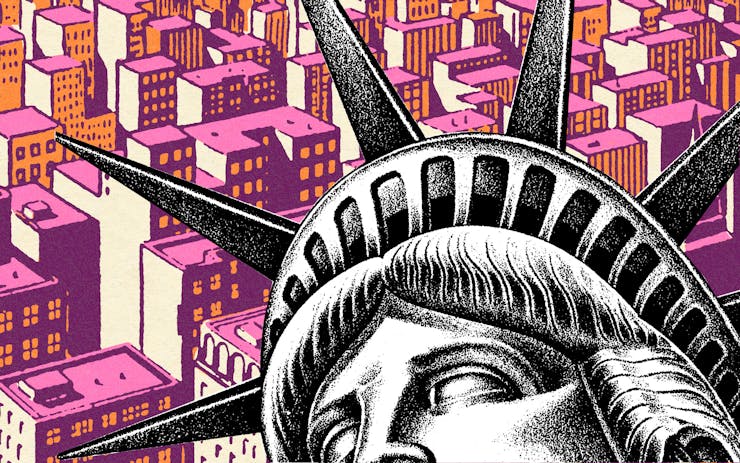New York Governor Andrew Cuomo unveiled details of his cannabis legalization plan on Tuesday afternoon in his State of the State speech, as well as in the details of his fiscal year 2020 budget. Cuomo’s plan would be the first in the nation to regulate medical marijuana, adult-use cannabis, hemp, and hemp-derived products such as CBD under one state agency, a proposed new Office of Cannabis Management.
The proposal also emphasizes equity in a broad, vague way: Cuomo said legalizing cannabis must occur in a way that creates “an economic opportunity for poor communities and people who paid the price, not for rich corporations who are going to come in to make a buck.”
3-Tier Licenses, Capped
As for what that would actually look like, Cuomo’s budget book proposes a “three-tiered model of distribution,” which would mean growing, distributing and selling cannabis would all be covered by different licenses given out by an Office of Cannabis Management (OCM). Three-tiered licensing is how Washington State set its system up, based on the state’s three-tiered alcohol industry model.
Here are the highlights of Cuomo’s plan:
- A new agency, the Office of Cannabis Management, would regulate the state industry, including hemp and hemp-derived products such as CBD.
- Home growing would not be allowed for adult-use consumers. Registered medical patients and caretakers could grow a maximum four plants per person or eight per household.
- The number of licensed cannabis growers and retailers would be limited.
- Growers could not also be retailers.
- Grower license caps are expected to prevent New York’s market from becoming flooded with cannabis like Oregon, thus crashing prices.
- Liquor store owners would be cut out of the cannabis market. Legislative language in the budget prohibits the holder of an alcohol retail license from acquiring a cannabis retail license.
- There’s a focus on craft growing operations and co-ops to “ensure meaningful and sustained participation by communities disproportionately harmed by cannabis prohibition.”
- The OCM would be in charge of sealing certain cannabis-related criminal records and directing money to neighborhoods harmed by prohibition.
- The OCM would also ensure quality control for both recreational and medical cannabis, as the Cannabis Control Commission does in Massachusetts.
Stores Open in 2020?
The governor’s budget director, Robert Mujica, told reporters in Albany that cannabis retail establishments could be open as soon as next year if legislation passes this year.
In addition, as Cuomo had said earlier this week, the governor announced in his speech that counties and large cities would be allowed to opt-out of hosting dispensaries within their borders.
Pay the Taxman
Cuomo’s plan would tax cannabis at three stages of distribution. Those taxes would include:
- A cultivation state tax of $1 per dry weight gram of flower, and $0.25 per dry weight gram of cannabis trim.
- A wholesale state tax, paid by the retailer at a rate of 20% of the invoice price, when purchasing wholesale cannabis from growers and/or processors.
- A second wholesale tax, 2% of the invoice price, that will be dedicated to the county in which the retail store is located.
Devil Will Be in the Details
Advocates and legislators in favor of recreational cannabis reacted with cautious optimism. State Sen. Liz Krueger, the sponsor of the Marijuana Regulation and Taxation Act, told Leafly,“I am glad that the Governor has embraced the necessity of ending the prohibition on adult-use marijuana,” but that she had to review the exact details of the executive budget proposal.
“We want to see a policy that is responsive to the lives of New Yorkers, not solely business interests,” Kassandra Frederique, the director of the New York State Drug Policy Alliance said in a statement after the speech. DPA officials said they were also waiting to go over the full text of the proposed legislation, and called for the Cuomo administration to include a micro-licensing structure and a small business incubator program in the law that ultimately passes, in order to let local cannabis businesses thrive.
As for the idea of local bans, state Sen. Julia Salazar tweeted that local bans were “unacceptable” because they disadvantage New Yorkers in ban counties from entering the potentially lucrative trade. “New Yorkers have been enormously harmed by criminalization. Alleviating that harm must be our top priority.”
Correction: An earlier version of this article misstated the plan’s restrictions on home cannabis cultivation. Homegrow would not be allowed for adult-use consumers, but registered medical patients and caretakers could grow a maximum four plants per person or eight per household.




